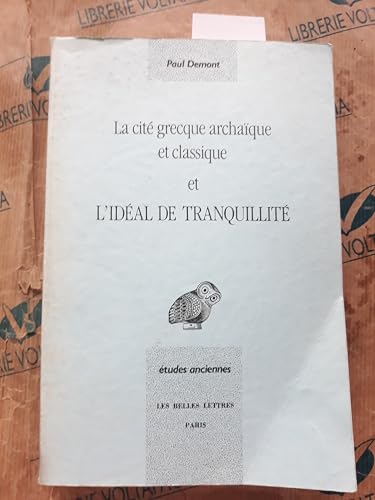Verwandte Artikel zu La cité grecque archaïque et l'idéal de tranquillité:...
La cité grecque archaïque et l'idéal de tranquillité: La cité grecque archaïque et classique et l idéal de tranquillité. - Softcover

Zu dieser ISBN ist aktuell kein Angebot verfügbar.
Alle Exemplare der Ausgabe mit dieser ISBN anzeigen:„Über diesen Titel“ kann sich auf eine andere Ausgabe dieses Titels beziehen.
- VerlagBelles Lettres
- Erscheinungsdatum1990
- ISBN 10 2251326332
- ISBN 13 9782251326337
- EinbandTapa blanda
- Auflage1
- Anzahl der Seiten440
Versand:
EUR 25,00
Von Niederlande nach USA
Beste Suchergebnisse beim ZVAB
La cité grecque archaïque et classique et l'idéal de tranquillité.
Buchbeschreibung Zustand: Antiquarian. Les Belles Lettres, Paris, 1990. 430p. Paperback. Series: Collection d'études anciennes, série grecque, 118. Nice copy. 'The competitive nature of ancient Greek society is an important aspect of Greek social institutions. The agonistic ideal and the pursuit of honour through work and other forms of activity were concepts central to the Greek way of life. (.) The contrary tendency, 'apragmosune', which can be defined as quietism or minding one's own business, is not as clearly understood. (.) The queitist was seen to be conservative and reactionary; he was out of tune with the majority, and his attitude was equated with apathy and idleness. Nevertheless, despite such hostility, the ideal of 'apragasmosune' is a theme which can be traced in Classical literature. (.) The aim of this present book is the study of the development of the ideal of quietism and leisure in private and public life of Greece. (.) The first section traces the development of leisure in the Archaic period. The chapters include discussion of the appearance of the ideal of civic leisure and the evidence to be found in Homer and Hesiod. This section culminates with a detailed analysis of the eight ode of Pindar which is addressed to the goddess Hesychia, and his idealisation of leisure. (.) The major part of the book concerns the study of public quietism in Classical Greece. Here the evidence is more abundant. (.) Quietism questioned democratic values and the members of the aristocracy along with the conservative farmer were seen to stand in contrast to the democrat. Thus the second part of the book contains two major themes. First it studies the development of quietism in democracy; and secondly, it analyses the impact of quietism on the literature of the Classical period with chapters detailing its influences in drama, the historical works of Herodotus and Thucydides, and rhetoric. The conclusions reached in this section of the study (.) set the scene for the third section of the study. This part analyses the theoretical studies of quietism and leisure to be found in the philosophical works of the fourth century B.C. and the concept of non-involvement to be found in the orators. Rather than being the object of scorn and the refuge of the idle, here leisure time is praised for the opportunity which it provides for the individual to indulge in higher contemplative pursuits, such as political activity and philosophy. The nature of the evidence for quietism, and especially the fact that it comes overwhelmingly from the reaction to democracy at Athens, makes the general conclusion that Archaic and Classical literature praises quietism for its political aims in attempting to ensure the safety of the state, almost inevitable. (.) The book highlights an aspect of Greek values which is often little considered in popular literature, and which by its very nature is difficult to study. As it stand, however, the book is really for the specialist.' (E.J. OWENS in The Classical Review (New Series), 1992, pp.98-99). From the library of Prof. Carl Deroux. Antiquarian. Artikel-Nr. 48382
Weitere Informationen zu diesem Verkäufer | Verkäufer kontaktieren

